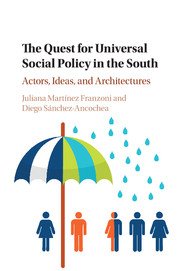Book contents
- Frontmatter
- Contents
- List of Figures
- List of Tables
- Acknowledgements
- List of Abbreviations
- Part I Universalism in the South
- Part II A Comparative Study of Policy Architectures
- Part III Building Universalism in Costa Rica
- Part IV Conclusions
- 8 Actors and Ideas in Comparative Perspective
- 9 The Quest for Universalism: Implications for Contemporary Policymaking
- References
- Index
9 - The Quest for Universalism: Implications for Contemporary Policymaking
from Part IV - Conclusions
Published online by Cambridge University Press: 10 November 2016
- Frontmatter
- Contents
- List of Figures
- List of Tables
- Acknowledgements
- List of Abbreviations
- Part I Universalism in the South
- Part II A Comparative Study of Policy Architectures
- Part III Building Universalism in Costa Rica
- Part IV Conclusions
- 8 Actors and Ideas in Comparative Perspective
- 9 The Quest for Universalism: Implications for Contemporary Policymaking
- References
- Index
Summary
Introduction
During the 1980s and 1990s the aspiration of delivering social services and transfers for all was abandoned in most of the South. New programs were primarily targeted to low-income groups, while the rest of the population was encouraged to rely on the market. Fortunately things have gradually changed since the early 2000s. A growing concern with equity – in the context of international attention to inequality and its costs (Piketty, 2013; Wilkinson and Pickett, 2009; World Bank, 2006) – together with new social demands have led to a renewed attention to universalism. In Latin America, the change of mood was triggered by the ascent of left-wing parties to power.
In most cases, these policy efforts have focused exclusively on increasing coverage. At the national level, new programs have extended to the poor only some of the rights that other groups already had. At the international level, debates around the post-MDGs agenda have paid more attention to access than to closing the gaps between countries in the level and quality of benefits. Defining universalism without strong concern for generosity and equity reinforces hierarchical differences, with some people receiving more generous benefits than others.
Albeit positive to bring new options to the center stage, this approach to universalism is a far cry from the comprehensive normative use, which calls for similar benefits for all based on general taxation and the principle of citizenship and residency. Influenced by the Nordic successful record, this broad definition has been linked to many positive results, including a higher redistribution of income, increases in social cohesion and more competitive economies (Chapter 2).
Unfortunately, policymakers across the South face mounting obstacles to develop this social-democratic ideal: fiscal resources are limited, electoral cycles are short, the need to show immediate results is high, unmet social demands are pressing, and initial levels of social inequality significant. In creating and reforming policies, governments must thus deal with tough trade-offs. Should they place resources in non-contributory basic services just for those in need? Or should they undertake costly reforms that reach everyone, seeking to mix the poor and the middle class? For example, should they introduce nurseries for poor children alone or develop broad childcare programs that aspire to incorporate the middle class?
- Type
- Chapter
- Information
- The Quest for Universal Social Policy in the SouthActors, Ideas and Architectures, pp. 202 - 216Publisher: Cambridge University PressPrint publication year: 2016



